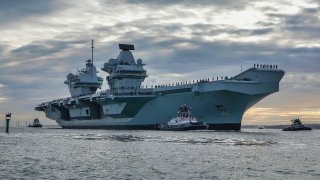The Royal Navy Could Become a Nuclear Navy (As in 'Nuclear' Aircraft Carriers?)
The UK's Royal Navy is exploring nuclear propulsion for its surface warships, as seen in a recent Request for Information (RFI) from the Ministry of Defence.
Summary and What You Need to Know: The UK's Royal Navy is exploring nuclear propulsion for its surface warships, as seen in a recent Request for Information (RFI) from the Ministry of Defence.
-While the Royal Navy already operates nuclear-powered submarines, this RFI seeks technical details on using Generation-4 nuclear technologies for surface vessels.
-Although it’s unclear if the RFI hints at a nuclear-powered aircraft carrier or other large ships, the move aims to assess the potential for extended operation and reduced reliance on fuel supplies.
-However, given high costs and political shifts, nuclear propulsion may ultimately be deemed impractical for the Royal Navy’s surface fleet.
A Nuclear-Powered Royal Navy – It Could Happen
The U.S. Navy operates 11 nuclear-powered aircraft carriers and dozens of nuclear-powered submarines. In fact, the Navy has no conventionally powered subs or carriers, although 21 amphibious transport docks and 10 big-deck amphibious assault ships are conventionally powered.
During the Cold War, the United States also operated nine nuclear-powered cruisers, retiring the last of those – USS California (CGN-36) – in July 1999.
Though the sea service remains committed to nuclear propulsion for its carriers and subs, we are not likely to see nuclear-powered cruisers again, largely due to the high operating costs and large crews that were required to maintain them.
But the UK's Royal Navy sees the potential for nuclear-powered surface warships. This week, Britain’s Ministry of Defence issued a Request for Information (RFI) from local industry, UK Defence Journal reported on Tuesday.
The RFI called for detailed technical information: "The Royal Navy (RN) is seeking information regarding integrating Generation-4 nuclear technologies for surface ship employment. Exploring scopes for alternative energy paradigms, the Royal Navy is gathering information on energy solutions for powering large surface ships."
A Nuclear Aircraft Carrier or Something Else?
The UK's RFI doesn't specify what type of nuclear-powered vessel the Royal Navy could operate, but it should be noted that the British military's senior service operates six nuclear-powered fleet submarines of the Trafalgar and Astute classes, with two of the latter boats under construction. In addition, the Royal Navy has four nuclear-powered Vanguard-class ballistic missile submarines in service.
Those last boats are to be replaced in the early 2030s with the Dreadnought class – development has been ongoing since at least 2016.
The Royal Navy also operates two conventionally powered Queen Elizabeth-class aircraft carriers, and the UK previously explored the option of nuclear power for those warships. Currently, apart from the United States, France’s Marine National is the only operator of a nuclear-powered aircraft carrier – that navy’s flagship, Charles de Gaulle.
Given concerns in the UK over the cost of the two operational carriers, it would seem unlikely that London is exploring options for a future nuclear-powered flattop.
Rather, this would seem to be part of a forward-looking study that explores the options for nuclear propulsion in the future.

"While no decisions have been made regarding the procurement of nuclear technologies at this stage, the MOD's request for detailed technical information indicates that the Royal Navy is seriously considering how nuclear power could fit into its future fleet. As the RFI explains, this initiative is part of the Royal Navy’s broader effort to gather information that will inform its future strategic decisions," the UK Defence Journal reported.
"Through this RFI, the Royal Navy is seeking input from the defence industry to explore how nuclear power used so effectively in submarines could enhance the capabilities of its surface fleet. The move could allow ships to operate for longer periods, reduce their reliance on fuel supplies, and potentially transform how the Royal Navy operates at sea," the journal added.
But with Labour back in power in the UK, the "Global Britain" strategy adopted by the Conservatives could be put on the back burner or scuttled entirely. If anything, the RFI might just conclude that nuclear power is a huge waste of money that shouldn't be considered, given the high costs and potential dangers.
Author Experience and Expertise: Peter Suciu
Peter Suciu is a Michigan-based writer. He has contributed to more than four dozen magazines, newspapers, and websites with over 3,200 published pieces over a twenty-year career in journalism. He regularly writes about military hardware, firearms history, cybersecurity, politics, and international affairs. Peter is also a Contributing Writer for Forbes and Clearance Jobs. You can follow him on Twitter: @PeterSuciu. You can email the author: [email protected].
Image Credit: Creative Commons and/or Shutterstock.


